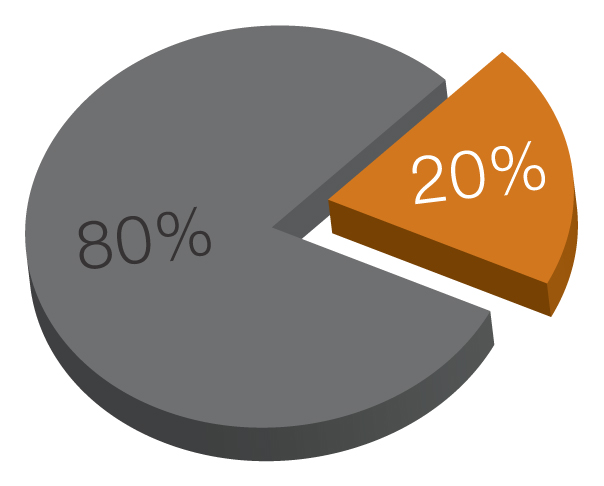It’s that time of year, again. The time when we reflect on the year that has passed, and more importantly, look ahead to next year and what we want to accomplish.
Some might call it making New Year’s Resolutions. We’re not big fans of this practice; all it really involves is making a list of things you want to do, without any plan. This year’s list probably resembles last year’s.
Instead, we’re fans of the 80/20 rule. Look at what you worked on and accomplished in 2016, and ask yourself what gained traction and what didn’t. Most likely, you’ll determine that about 80 percent of what you did worked fairly well, while 20 percent under performed.
For the 80 percent, keep at it in 2017. Keep refining, iterating, and making improvements. You don’t need to do anything drastic here, just keep building on your success.
For the remaining 20 percent, get rid of it! You gave it a shot, it didn’t work, and it’s time to move on.
What you do with that leftover bandwidth is where the magic happens. Innovation doesn’t happen through incremental improvement. It happens when you completely rethink things. When you knock the whole thing down and rebuild it from the ground up.
When you ignore the conventional wisdom of “the way it’s always been done” and find a new way to do it.
Here are some examples of companies who have done just that:
Lose the Keys
When was the last time you received a metal key for a hotel room? Hotels got rid of these relics a long time ago, followed shortly by commercial buildings. They were replaced by magnetic keycards and near-field communication (NFC) access passes.
Why, then, has this 19th-century lasted so long in private homes? Homes have seen significant innovations over the years, in home entertainment, heating & cooling, and appliances. We’ve even had robot vacuum cleaners for several years!
We’ve been holding the replacement to the jingly jangly keys in our hands for years. In fact, it may be in your hand right now. The smartphone.
Several companies, including Kwikset and Yale, have decided to lose the keys and offer products that let you lock and unlock your doors using your phone, literally from anywhere you can get internet access.
No more keys to lose. Kwikset and Yale saw an opportunity to cut out what wasn’t working for consumers and offer something completely new.
Electrifying Car Buying
By now, you should be familiar with Tesla, the company started by Elon Musk that makes sleek, all-electric cars.
Teslas are loaded with innovations, from on-board computer interfaces to an auto-pilot feature in some models. Not to mention, you’ll never see one at a gas pump. But what really makes Tesla unique is not the cars, but the way we buy them.
Almost everyone loves new cars, and everyone hates shopping for them. They car buying experience ranks up there with root canals for customer enjoyment.
Tesla is turning the industry on its ear by selling its own cars, going direct to consumers. While the rest of the auto industry fights this model, its benefits to consumers are undeniable. It takes time, money and most importantly, aggravation out of the equation.
Shedding Light on…Light
Another century-old technology that will soon be no more is the incandescent light bulb, and the future looks brighter (and more efficient).
For generations, these bulbs have illuminated our homes and burnt our fingers when we tried to change them. But in recent years, new, better options have been developed.
Most notably, technology innovators like CREE have taken what they know about light-emitting diodes (LEDs) and have developed products that are far superior to incandescent bulbs in every way. Now, they are sharing shelf space with giants like GE and Phillips.
Of course, the incandescent bulb’s demise is being ushered in with the help of the federal government, which made them illegal to import and manufacture. Still, it took some brilliant thinking to come up with this innovation.
What’s your 20 percent? How will you innovate in 2017?
It will take some thinking and measurement to determine what you can do to disrupt your industry, change the world, or even just improve your operations. But if you don’t, you risk standing still and making resolutions.




